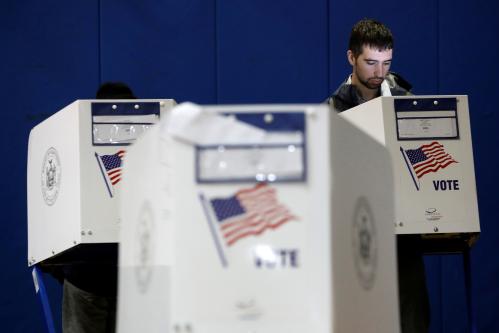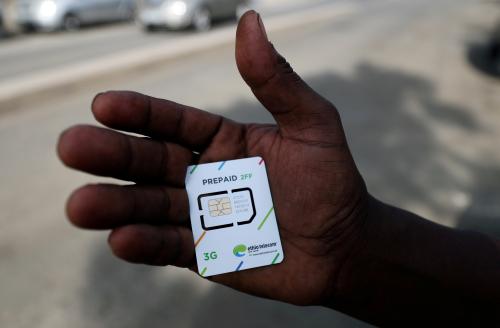What is the most effective way to deal with North Korea? To shun the rogue state for its lack of human rights would possibly endanger an agreement to dismantle their nuclear weapons program. To provide assistance to the country would essentially prop Kim Jong Il’s massive military, leaving the civilians to starve. So what are the options to improve both nuclear regulations and human rights?
An opportunity exists for exploring the creation of a multilateral forum to make possible a more comprehensive approach to human rights and humanitarian issues on the Korean peninsula. At the present there is no structure for raising these issues, but the precedent of the Helsinki Final Act of 1975 offers a model to follow and adapt to the Asian context. On the upcoming 30th anniversary of the HFA, governments and civil society advocates should be encouraged to work toward this goal.
Q: Arlington, Va.: I’m very concerned with the human rights abuses in North Korea. Is there anything the average American can do to help, or any agencies we can contribute to? Thanks for taking questions.
A: There are a number of human rights organizations that report on human rights abuses in North Korea, in particular, the US Committee for Human Rights in North Korea, Amnesty International and Human Rights Watch. You may wish to contact these groups and see their reports and join in any advocacy programs they have. You may also wish to write to your congressman and senator to support US action on human rights in North Korea.
Q: Washington, D.C.: Much attention has been paid to the plight of North Korean refugees in China. Given your experience in the area of internal displacement, do you know, are there any internally displaced persons in North Korea? To what extent are they being helped?
A: Little information exists about internally displaced persons in North Korea. The problem arose during the famine in the 90s when hungry North Koreans who couldn’t get across the border into China moved from village to village, or from urban to rural aras, foraging for food. However, many of those caught outside home areas were treated as criminals subject to punishment and were confined in centers created for people wandering in search of food. More recently, internal travel rules have been relaxed so that people can search for food more easily. There are also IDPs displaced by disasters and floods but in their case, the government has admitted the problem and accepted outside aid. In addition, there are “internal exiles,” the victims of forced relocation on political grounds. Because of the paucity of information, it is important that humanitarian organizations operating in North Korea be encouraged to collect information about all categories of IDPs. The World Refugee Survey puts the total at 100,000.
Q: washingtonpost.com: Would you tell us about some of the most recent Acts that Congress has passed in order to aid the plight of North Korean refugees?
A: The North Korea Human Rights Act of 2004 passed by the House of Representatives raises the profile of human rights issues and calls for their inclusion in US negotiations with North Korea. That includes the difficult plight of North Koreans who flee to China in search of food, work or to escape persecution. The Act designates North Koreans who have been perscuted or mistreated by the government as of special humanitarian concern to the US and takes steps to facilitate their entry into the US. Although the intent is excellent, it may be more symbolic than real since North Koreans have little possibility of reaching the US. It is nonetheless significant to flag the issue. The Act also importantly calls upon the UN High Commissioner for Refugees to take steps to secure access to North Koreans in China — access which currently is denied. This is an issue it would be important for the US to press.
Q: Toronto, Canada: Could you comment on the debate in the humanitarian community about whether food aid to North Koreans serves principally to save lives or, rather, to shore up the regime? Thank you.
A: There is a split in the humanitarian community over food aid. Whereas the World Food Program argues that its access to hungry North Koreans is increasing, leading non-governmental groups have walked out because they could not guarantee that their aid was reaching people beyond the military and communist elite. Most humanitarian organizations, however, support continued extension of food aid to North Korea but argue that standards should be insisted upon and progress made toward meeting them.
Q: Washington, D.C.: What policies do you support to ameliorate the situation in North Korea? What organizations do you get information for policy development from?
A: I believe attention should be paid to establishing a multilateral framework –like the Helsinki process for the former Soviet Union — that would focus on the Korean peninsula. Within this multilateral framework there would be discussions of security concerns, economic and scientific issues and human rights and humanitarian problems. In this way progress on human rights and humanitarian issues would not be forgotten but rather brought into the context of progress in strategic, political and economic areas. The Organization for Security and Cooperation in Europe could provide technical assistance and guidance to develop such a process for the Korean peninsula.
Q: Washington, D.C.: What do you think will happen after Kim Jong Il passes power to the next generation? Do you think North Korea will gradually open up, like China has under capitalist pressure?
A: One can only speculate, but to judge by what’s happening in China and also what happened in Russia and Eastern Europe, it is hard to imagine that a successor government would closely resemble the current North Korean regime. Some degree of opening toward the rest of the world is already occurring and reunification of the Koreas will undoubtedly take place at some point in the future as well.
Q: washingtonpost.com: Does China currently treat North Korean refugees as economic migrants? Does the North Korean Human Rights Act 2004 encourage China to stop sending these “migrants” back to North Korea and to start offering them a path to asylum?
A: Yes, China does treat North Korean “refugees” as economic migrants and refuses to allow the UN High Commissioner for Refugees to have access to them to determine their status. There are between 200,000-300,000 North Koreans who have fled to China, but they are in a precarious position. In 2003 and also this year, China has begun cracking down on the North Koreans and deporting them, where they await arrest and confinement. To its credit, UNHCR is calling all North Koreans in China “persons of concern”, since irrespective of their motives for leaving, mistreatment upon return to North Korea gives those who departed a strong claim to some sort of protected status. The North Korean Human Rights Act is intended to send a signal on this score. You may want to look at Refugees International reports which monitor closely the plight of North Koreans in China.
Q: Washington, D.C.: Are you among the minority pushing for a Helsinki process? Who is working with you?
A: This is an idea that has been promoted by a number of scholars, for example James Goodby writing in the Korean Journal of Defense Analysis back in 1990. More recently, in 2003, a meeting in Prague on human rights in North Korea, bringing together a wide range of persons who follow human rights in North Korea, endorsed the idea, as has the president of the National Endowment for Democracy. A Brookings Institution-Refugees International meeting in 2004 discussed this idea as well and a humanitarian and human rights agenda drawn up after the meeting endorses it (see Brookings website under Internal Displacement). It should be noted that the government of South Korea plays an active role in the Organization for Security and Cooperation in Europe and has often stated that its special relationship with the OSCE (where it is a “partner for cooperation” offers a model for secutity and stability in the Korean peninsula.
Q: Munich, Germany: Sanctions tend to hit the wrong people, especially in well established, authoritarian dictatorships. The rich, ruling class is somehow still able to get what they want, and the poor masses struggle for their next meal. Even Iraq was a good example of this phenomenon. What incentives, positive or negative, can America offer for Kim Jong Il to give up his nuclear ambitions? If you consider the expense of developing nuclear weapons, and the moneys diverted from feeding the nation, these two issues are definitely intertwined. In my opinion, the nuclear dilemma is the harder nut to crack. If you solve this issue, human rights will be much easier to address.
A: Security issues and human rights issues should be dealt with as a whole. Indeed, there is precedent for addressing human rights concerns while negotiating arms control agreements — namely the arms negotiations between the United States and the former Soviet Union. The record of these negotiations shows that both security and human rights can be addressed comprehensively. It should also be underscored that how a government treats its population is an indicator of its reliability in carrying out nuclear weapons agreements. Moreover, development aid and foreign investment in a country with forced labor must be linked to human rights standards.
Q: Washington, D.C.: In response to the current leadership of North Korea, do you think there has been any backtracking due to the change of President in South Korea two years ago? Do you think former South Korean President Kim’s “Sunshine Policy” made an impact? It seemed like relations between the two nations were getting better for a time, but now they seem worse.
A: South Korea’s policy of engagement with the North continues, based on the view that this is the best way to nudge North Korea down the road toward greater openness, political reform and a free market economy. There have been some results — family reunifications, more exchanges, direct talks, and the South is now even developing an industrial zone in the North. But the policy has also been heavily criticized for offering trade, aid, and exchanges but gaining too little in return. In fact, when reunification occurs, South Korea may have alot of explaining to do about why it failed to stand more firmly against the horrendous human rights abuses inflicted upon its compatriots in the North.



Commentary
Live Internet Chat on North Korea with Roberta Cohen
September 2, 2004